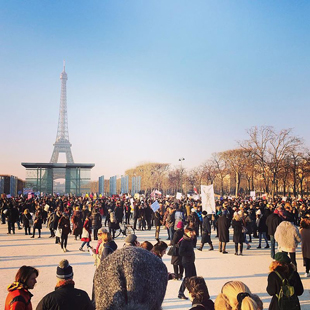For Sunday February 5, 2017
Lectionary Readings (Revised Common Lectionary, Year A)
Isaiah 58:1–12
Psalm 112
1 Corinthians 2:1–16
Matthew 5:13–20
A guest essay by Ruth Everhart, a Presbyterian pastor for twenty years, currently serving a small church in Bethesda, Maryland. She is also the author of two spiritual memoirs: Ruined, named a 2017 "Book of the Year" by Christianity Today, about her rape as a student at a Christian college; and Chasing the Divine in the Holy Land (2012), about her pilgrimage to Israel and Palestine. For more, see rutheverhart.com.
During an election cycle, we citizens become familiar with stump speeches. These are the talking points that political candidates repeat at every campaign stop. If the speakers are particularly adept, the refrains they use will echo even after they have moved on to the next stop. Indeed, certain phrases become associated with a particular face and voice and agenda, so that even fragments of the speech will call to mind the candidate’s entire platform.
The Sermon on the Mount is Jesus’ stump speech, if you will, and the Beatitudes are nine refrains that echo long after Jesus has moved on. Picture the “Blessed Are” statements on placards, borne aloft in the sea of faces around Jesus. These fragments form the context for the gospel this week about salt and light — which seem simple enough to be campaign slogans, but which are followed up with the confounding exhortation about righteousness: “For I tell you, unless your righteousness exceeds that of the scribes and Pharisees, you will never enter the kingdom of heaven.”
 |
|
Women's March 2017, London.
|
Given Jesus’ attitude toward the Pharisees, that verse alone is worthy of much study. Is he referring to a more narrow fixation on the law, or a broader interpretation? Is he referencing the outward keeping of regulations, or the inward attitude of the heart?
At any rate, “Blessing” and “Righteousness” are the bookends to the Salt & Light passage. These two words give body and substance to what seem to be such simple phrases.
“You are the salt of the earth. You are the light of the world.”
Not, you will be the salt of the earth. But you are, now, and here, salt.
Not, you will be the light of the world. But you are, now, and here, light.
Who is Jesus addressing? Who is the salt of the earth? Those who are humble, those who mourn, those who are meek, and those who thirst after doing what is right.
Salt creates thirst, does it not? The righteous are blessed to thirst after doing what is right. They are salty and so they thirst.
And who is Jesus calling the light of the world? Those who are merciful, those who are pure in heart, those who are peacemakers, and those who receive abuse for standing up for what is right.
Righteousness is a form of light, is it not? The righteous are blessed to show forth purity and peace as they stand up for what is right. They shed light through their actions.
 |
|
Women's March 2017, Paris.
|
Stump speeches may seem a sour topic right now, a far cry from the gospel and its good news. Our nation is in the midst of a particularly contentious political season, one shedding more heat than light. You might even say we’re embroiled in this season. Perhaps the word tickles my fancy because something em-broiled begs for seasoning. It begs for salt. And surely it makes us thirsty to do what is right.
Perhaps the most difficult part of this passage is that it cycles us back to righteousness, which we understand in the abstract, but struggle with in the particulars.
Any disciple worth her salt knows that righteousness is the goal. It forms our telos — that thing we drive toward. But how will keeping the Pharisaic law drive us toward righteousness? Jesus does not elaborate.
The answer must be found in salt and light, these elemental things that are so multi-faceted. Even though they are simple, there is nothing innocuous about either element.
Salt preserves. Salt flavors. But salt can also sting and burn and abrade.
Light dispels darkness. Light sheds illumination. But light can also blind, either temporarily or permanently.
Christians want to be salt and light, but we struggle to know how and when, and to what extent.
Take, for example, our recent political theater. After the pomp and circumstance of the inauguration of Donald J. Trump as the 45th President of the United States came the Women’s March on Washington, with sister marches around the country, and indeed the globe.
For some marchers, this was a way to be salt and light, while for others, the marchers were nothing but abrasion.
So should we spend more time talking about salt and light, or more time marching and clarifying the messages we carry on our placards?
 |
|
Women's March 2017, Washington, DC.
|
Which is easier for our churches to do? Which is a more direct response to the times we find ourselves in?
Would Jesus have marched? Would Jesus have blessed the marchers?
How does the gospel improve the flavor of our life together — as followers of Jesus, as congregations, as a nation? What if we weren’t afraid of the sting of salt?
What if we spent less time arguing about the design of our lamp stands — as really, so much Christian talk amounts to — and spent more time shedding light on the darkness that surrounds us?
If you intend to be a salty, well-lit disciple, be advised to re-read Jesus’ stump speech. The waving placards of “Blessed Are” might seem quite inspiring until you realize that Jesus actually means business. This righteousness is not for the faint of heart. What Jesus has in mind might be stinging, blinding righteousness!
Image credits: (1–3) Wikipedia.org.





